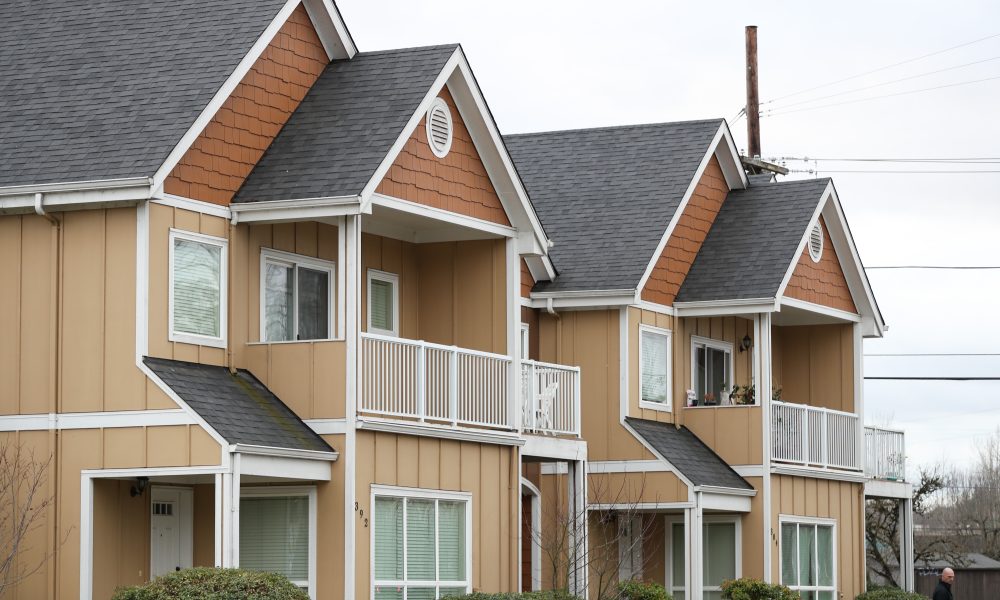Oregon lawmakers plan to spend nearly $200 million within the next few weeks to address housing and homelessness, describing it as a “down payment” with more to come.
A trio of Democratic lawmakers on Wednesday shared the details of their plan, which also includes new policies to slow evictions and streamline home building permits. A pair of bills – one with policies and one with spending – are expected to pass through House committees Thursday and next week and be ready for a vote on the House floor the second week of March.
“We know our communities need relief now,” said Rep. Maxine Dexter, D-Portland and the chair of the House Committee on Housing and Homelessness. “So we’re making an unprecedented push to take bold and definitive action early in session with the goal of passing this package by mid-March.”
Dexter and her counterpart in the Senate, Portland Democrat Kayse Jama, said they worked closely with Republican colleagues to craft the measure. It includes some Republican priorities, such as a pitch from Sen. Dick Anderson, R-Lincoln City, to provide low-interest loans for developers building homes for middle-income Oregonians.
More money
The housing package includes the $130 million requested by Gov. Tina Kotek earlier this year. Kotek’s request consisted of:
- $54.4 million to help 1,200 homeless individuals or families find new homes.
- $33.6 million for rent assistance and eviction prevention services. The governor’s office estimated this will help keep 8,750 families from losing their homes.
- $23.8 million to add 600 shelter beds statewide. These will be low-barrier beds, meaning that people don’t need to be sober, employed or pass criminal background checks to receive shelter.
- $5 million to Oregon’s nine recognized tribes for their homelessness services.
- $5 million to increase capacity for “culturally responsive organizations” to work toward equitable outcomes for homelessness.
- $2 million for cities and counties to use for sanitation services.
- $1.8 million for the state Office of Emergency Management and Oregon Housing and Community Services to coordinate the state’s handling of the homelessness crisis.
Lawmakers added tens of millions more, including:
- $27 million to address homelessness in 25 rural counties that weren’t included in Kotek’s January emergency order because homelessness has increased at slower rates there than in urban areas.
- $25 million earmarked for homeless youth, to help young people and their families with rent assistance, shelter and mental health or substance abuse treatment.
- $20 million to encourage production of modular homes, which are built in factories and then placed in foundations or stacked to make apartment buildings.
- $5 million in grants for farmers to improve health and safety conditions at farm worker camps.
- $3 million in revolving loans builders can use to pay for predevelopment costs, such as permits and local infrastructure fees, for homes that will be affordable to people earning between 80% and 120% of the median income in their area.
More spending will be coming later in the legislative session, said Rep. David Gomberg, D-Otis and the chair of the budget-writing subcommittee that will handle housing funding. His subcommittee will consider Kotek’s proposed budget, along with any legislative proposals that carry price tags, as it crafts a housing budget for the 2023-25 budget period.
Kotek’s suggested budget includes nearly $3.8 billion for the Oregon Housing and Community Services Department – a slight decrease from the almost $3.9 billion allocated in the last two-year budget, when lawmakers spent $1.5 billion in one-time funds, but nearly double the $1.9 billion the agency received in the 2019-21 budget cycle.
New land use and eviction policies
The package includes major changes to the state’s 50-year-old land use system, shifting to prioritize building housing over “citizen engagement” in decisions about what can be built where. Critics of Oregon’s land use system have long maintained that the state’s laws make building desperately needed housing take too long and cost too much. The state needs to build more than 550,000 new homes over the next 20 years to meet current and expected demand, according to the Oregon Department of Land Conservation and Development.
The measure would require Oregon Housing and Community Services to produce annual housing production targets for each city with at least 10,000 residents, including subsidized and market-rate homes.
From there, the state Department of Land Conservation and Development could take action against cities that fail to build enough homes, including obtaining a judge’s order forcing a city to comply or forcing a city to forfeit grant funds or other state funding.
“We will make sure local governments, special districts and state agencies work together to ensure that we break down barriers and remove red tape that has prevented us from building the housing we need,” Dexter said.
Separately, the proposal would extend eviction timelines for unpaid rent. Landlords can now give 72-hour notices and obtain court judgements against tenants within 25 days of giving that notice. The proposal would give tenants 10-day notices and extend the court timeline, meaning a trial could occur almost two months after a tenant first misses a rent payment.
“We all know that eviction leads to homelessness,” Jama said. “Evicting somebody and putting them on the streets is really, really challenging for all of us and it’s more expensive to be on the streets than being housed.”
STORY TIP OR IDEA? Send an email to Salem Reporter’s news team: [email protected].
SUBSCRIBE TO GET SALEM NEWS – We report on your community with care and depth, fairness and accuracy. Get local news that matters to you. Subscribe today to get our daily newsletters and more. Click I want to subscribe!

Julia Shumway is deputy editor of Oregon Capital Chronicle and has reported on government and politics in Iowa and Nebraska, spent time at the Bend Bulletin and most recently was a legislative reporter for the Arizona Capitol Times in Phoenix. An award-winning journalist, Julia most recently reported on the tangled efforts to audit the presidential results in Arizona.









